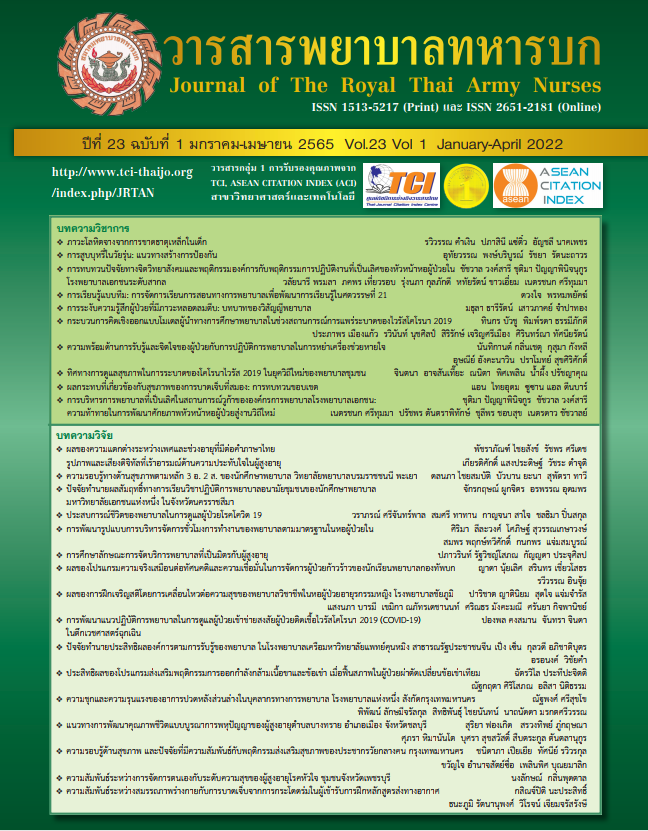Effectiveness of a Program Promoting Behaviors Exercise of Leg and Knee Muscles to Recovery in Patients with Total Knee Arthroplasty
Keywords:
Behaviors exercise, Total Knee ArthroplastyAbstract
The purpose of this research was to investigate the effectiveness of a program promoting behaviors exercise of leg and knee muscles to recovery in patients with total knee arthroplasty. The sample consisted of 20 patients undergoing total knee arthroplasty. The sample was assigned into two groups: the experimental group (n = 10) and the control group (n = 10). The research instruments for data collection were the questionnaire on general information, range of motion record which examination for quality by four experts. The Reliability of questionnaire on perceived self-efficacy of exercising leg and knee muscles, questionnaire on outcome expectation of exercising leg and knee muscles, questionnaire on social support, questionnaire on behaviors of exercising leg and knee muscles and the questionnaire on recovery after total knee arthroplasty were .88, .92, .86, .91 and .94
The results found that the both groups had higher perceived self-efficacy and outcome expectation of exercising leg and knee muscles than before experiment. Furthermore, there were the statistically significant differences in behaviors of exercising leg and knee muscles, social support, recovery after total knee arthroplasty and average knee flexion for both groups in after experiment. (p<.05).
Downloads
References
The Royal College of Orthopaedic Surgeons of Thailand. Guideline for the Treatment of Osteoarthritis of Knee 2011. Bangkok: The Royal College of Orthopaedic Surgeon of Thailand; 2011. (in Thai)
Pereira D, Peleteiro B, Aravjo J, Brancos, J, Santos RA and Romos E. The effects of osteoarthritis definition on prevalence and incidence estimates: a systematic review. Osteoarthritis Cartilage 2011; 19(11): 1270-1285.
Cooper C, Dennison E, Edwards M and Litwic A. Epidemiology of osteoarthritis. Medicographia. 2013; 35: 145-51.
Suphachatwong C. Fracture and dislocation of the hip and fracture femur. In Wajanavisit W, Laohacharoensomba W, Kawinwonggowit V. and Mulpruek P. editor. Orthopedic. Bangkok: Holistic Publishing; 2004. (in Thai)
Rojanastien S. Joint surgery. In Louthrenoo W. editor, Osteoarthritis of Knee. Chiang Mai: Thanaban Printing; 2003. (in Thai)
Aree-Ue S and Piyakhachornrot N. Outcomes of Health Education and Home-Based Exercise Programs for Patients with Knee Osteoarthritis. Thai Journal of Nursing Council. 2008; 23(3): 72-84. (in Thai)
Khunphasee A. Therapeutic Exercise. In: Intarakamhaeng P, editor. Rehabilitation medicine textbook. 1st ed. Bangkok: Nam Akson Printing House; 2009. (in Thai)
Gerawarapong C. Adherence to Inpatient Rehabilitation Clinical Practice Guideline for Patient with Knee Osteoarthritis after Total Knee Replacement. ASEAN J Rehabil Med. 2011; 21(3): 99-102. (in Thai)
Yimneum P. Factors Related to Health Behaviors of the Osteoarthritis Patients Post Operation of Total Knee Arthroplasty (thesis). Bangkok: Kasetsart University; 2013. (in Thai)
Ketetanee R, Waramit W, Taiwong A and Baothong K. The Effects of Self-Efficacy Promoting and Social Support Program on Knee Flexion Ability among Patients Undergoing Total Knee Arthroplasty. MAHASARAKHAM HOSPITAL JOURNAL. 2018; 15(2): 133-143. (in Thai)
Bandura A. A Self-efficacy: The exercise of control. New York: W.H. Freeman and Company. 1997.
House JS. Work stress and social support. Reading, Mass: Addison-Wesley.1981.
Rittiruang A. The Effects of the Noraprayuk Exercise Program applying Self-Efficacy and Social Support on Glycosylate Hemoglobin levels among older adults with Diabetes Mellitus type 2. (thesis). Chonburi: Burapha University; 2015. (in Thai)
Polit DF and Hungler BP. Nursing research: Principles and methods. 5th ed. Philadelphia, PA: J.B, Lippincott and Company. 1995.
Lerdruampattana S. Effects of the application of self-efficacy theory in home-based leg muscle exercise promotion on patients with total knee replacemen (thesis). Chonburi: Burapha University; 2007. (in Thai)
Boonprakob T. Selected Factors Related to Postoperative Recovery in older person with Total Knee Arthroplasty (thesis). Bangkok: Chulalongkorn University; 2016. (in Thai)
Aksaranugraha S. Modified WOMAC scale for knee pain. Journal of Thai Rehabilitation Medicine. 2000; 9(3): 82-85. (in Thai)
Sirited P and Thammaseeha N. Self-Efficacy Theory and Self-Healthcare Behavior of the Elderly. Journal of The Royal Thai Army Nurses. 2019; 20(2): 58-65. (in Thai)
Bolt Z, Capezuti E, Fulmer T and Zwicker D. Evidence-Based geriatric nursing protocols for best pratice. 4th ed. New York: Springer. 2012.
Phanjiraphak W. Effects of an exercise program on health promotion among elderly women in Samutprakan Province (thesis). Chon Buri: Burapha University; 2011. (in Thai)
Downloads
Published
How to Cite
Issue
Section
License
Copyright (c) 2022 Journal of The Royal Thai Army Nurses

This work is licensed under a Creative Commons Attribution-NonCommercial-NoDerivatives 4.0 International License.
บทความหรือข้อคิดเห็นใดใดที่ปรากฏในวารสารพยาบาลทหารบกเป็นวรรณกรรมของผู้เขียน ซึ่งบรรณาธิการหรือสมาคมพยาบาลทหารบก ไม่จำเป็นต้องเห็นด้วย
บทความที่ได้รับการตีพิมพ์เป็นลิขสิทธิ์ของวารสารพยาบาลทหารบก
The ideas and opinions expressed in the Journal of The Royal Thai Army Nurses are those of the authors and not necessarily those
of the editor or Royal Thai Army Nurses Association.






